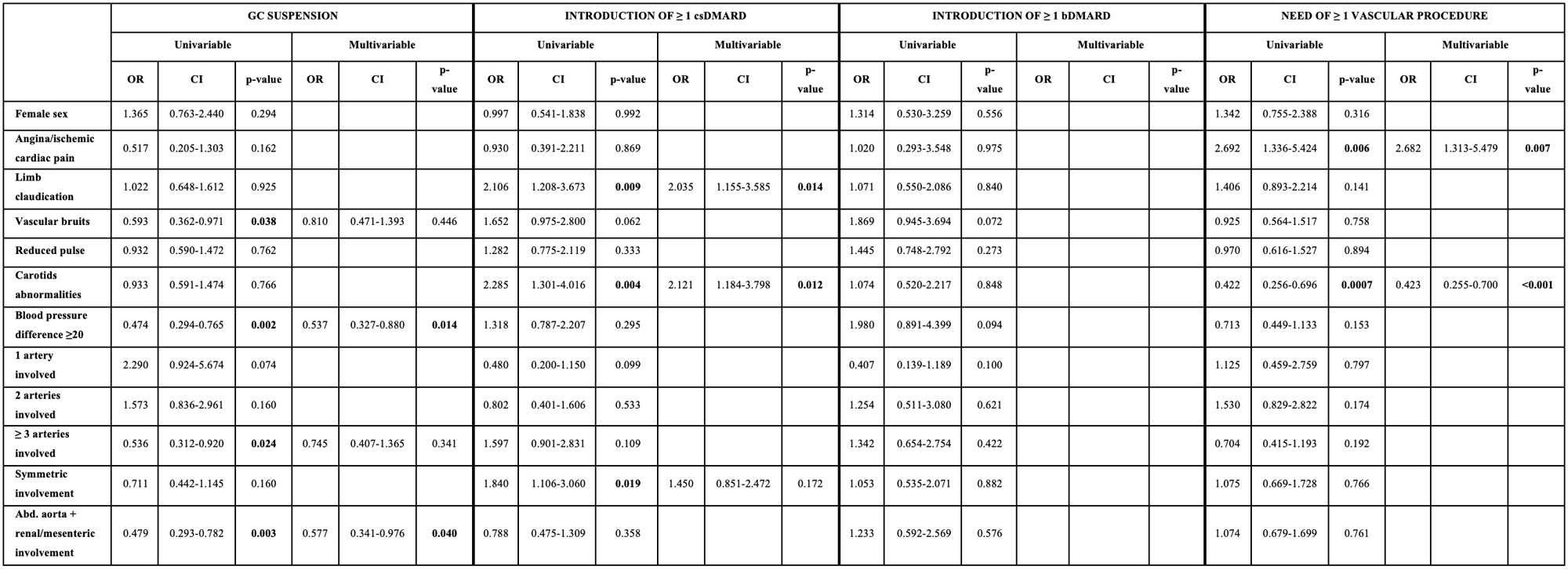Session Information
Date: Monday, November 13, 2023
Title: (1554–1578) Vasculitis – Non-ANCA-Associated & Related Disorders Poster II
Session Type: Poster Session B
Session Time: 9:00AM-11:00AM
Background/Purpose: The 2022 ACR/EULAR classification criteria for Takayasu arteritis (TAK) rely on a point-based clinical and imaging scoring system (from 0 to 22). The aim of this study is to investigate whether the baseline cumulative score and the fulfillment of each item included in the score correlate with the long-term prognosis of TAK patients.
Methods: Data of TAK patients from 4 centres (2 from Italy; 2 from India) were retrospectively reviewed. For each patient, the score provided by the 2022 classification criteria was calculated and the following outcomes were evaluated: glucocorticoid (GC) suspension, need of conventional and biologic DMARDs (cs- and bDMARDs) introduction, need of vascular procedures. Data on bDMARDs were retrieved only from the Italian cohorts. Correlation of these outcomes with the cumulative baseline score and with single item fulfillment was assessed. Additionally, the correlation between baseline ACR/EULAR 2022 score and disease activity indexes (i.e., DEI.Tak, ITAS2010) was evaluated. Univariate and multivariate logistic analyses and Spearman correlation analyses were performed as appropriate.
Results: We included 407 patients (163 from Italy; 244 from India) with a median follow-up of 80 (IQR, 37-143) months. Mean baseline score was 10.1 ± 3.5 and 378 (92.9%) patients were classified as TAK according to the 2022 ACR/EULAR criteria. GCs were started in 348 patients (85.5%) and suspended in 110 (31.6%) after a median of 43 (IQR, 23-87) months. csDMARDs were started in 331 patients (81.3%) after a median of 1 (IQR, 0-5) month. bDMARDs were started in 108 patients (66.3%) after a median of 16 (IQR 8.8-39) months. Vascular procedures were performed in 101 patients (24.8%). Mean baseline DEI.Tak and ITAS2010 scores were 8.8 ± 5.5 and 10.4 ± 6.6, respectively. A higher baseline cumulative score was negatively associated with GC suspension (OR 0.901 [95%CI 0.844-0.962], p=0.002) and positively associated with csDMARD introduction (OR 1.102 [95%CI 1.027-1.184] p=0.007). No correlation with bDMARD start and vascular procedures was found. Table 1 shows the association of each item with different outcomes. At multivariate analysis, difference in blood pressure ≥20 mmHg and abdominal aorta + renal/mesenteric involvement were negative predictors of GC suspension; limb claudication and carotid abnormalities were predictors of csDMARD introduction. Angina/ischemic cardiac pain was predictor of need for vascular procedure, conversely to carotid abnormalities. Finally, a higher score strongly correlated with both baseline DEI.Tak (rho=0.549, p< 0.001) and ITAS2010 (rho=0.575, p< 0.001).
Conclusion: A higher baseline score obtained from the ACR/EULAR 2022 TAK classification criteria was associated with a more aggressive disease course. No specific item was associated with disease prognosis. At baseline, the ACR/EULAR 2022 score might be a surrogate of disease activity scores.
Univariate and multivariate logistic analyses evaluating the association of each item with different outcomes
To cite this abstract in AMA style:
Rinaldi E, Campochiaro C, Padoan R, Kavadichanda C, Jose A, Singh K, Iorio L, Viapiana N, Rathore U, Baldissera E, Agarwal V, Dagna L, Misra D, Tomelleri A. Prognostic Assessment of the 2022 ACR/EULAR Classification Criteria for Takayasu Arteritis: A Multi-centre International Study [abstract]. Arthritis Rheumatol. 2023; 75 (suppl 9). https://acrabstracts.org/abstract/prognostic-assessment-of-the-2022-acr-eular-classification-criteria-for-takayasu-arteritis-a-multi-centre-international-study/. Accessed .« Back to ACR Convergence 2023
ACR Meeting Abstracts - https://acrabstracts.org/abstract/prognostic-assessment-of-the-2022-acr-eular-classification-criteria-for-takayasu-arteritis-a-multi-centre-international-study/

